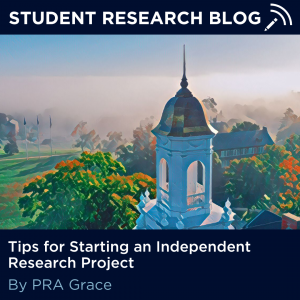By Grace Vaidian, Peer Research Ambassador
 As I transitioned from conducting research in high school to embarking on a new academic journey in higher education at UConn, I couldn’t help but notice some distinct differences in the research landscape. Back in high school, my research endeavors were predominantly solitary. I would conceive a project idea, gather the data, write a research paper, and even compete in science competitions, all largely on my own. However, once I became an undergrad at UConn, I quickly realized that the normal approach to research was notably different.
As I transitioned from conducting research in high school to embarking on a new academic journey in higher education at UConn, I couldn’t help but notice some distinct differences in the research landscape. Back in high school, my research endeavors were predominantly solitary. I would conceive a project idea, gather the data, write a research paper, and even compete in science competitions, all largely on my own. However, once I became an undergrad at UConn, I quickly realized that the normal approach to research was notably different.
Here at UConn, a prevalent avenue for delving into research is to reach out to professors and join their existing projects. While the structure and guidance that this approach offers can be undeniably valuable (it’s how I obtained the research opportunities I’m currently working on!), there are students who feel like they have a brilliant research idea of their own but lack the know-how to bring these projects to life. I’m here to offer some tips on how to initiate and successfully navigate an independent research project.
Where to Begin: Identifying the Knowledge Gap
The first step in embarking on your independent research journey is to pinpoint a gap in knowledge. This is essentially an underexplored area that could greatly benefit from further research and discoveries. For some, this gap might be immediately apparent, but for others, including myself, it might require a bit more digging. One effective way to identify this gap is through a thorough literature review on a topic of interest. Most academic publications include insights into the unanswered questions and areas that warrant further investigation in the discussion or conclusion sections. This is a great starting point for coming up with your own research question. Additionally, this literature review process can give you ideas for a methodology to follow.
Finding a Mentor: A Valuable Guide on Your Journey
I know, the focus of this blog is how to do independent research, so why am I now suggesting finding a mentor? It’s important to recognize that even if you possess extensive knowledge on a particular topic, you’re still a student with much to learn. Having an expert to provide feedback and guidance on your project idea is invaluable and often mandatory to move a project forward. Once you’ve formulated a research question, you should collaborate with faculty or professionals willing to support your future steps. A case in point is a self-initiated project I worked on involving fentanyl overdose deaths. I realized that having open access to autopsy and toxicology reports would be impossible for a 16-year-old. However, by proposing my project idea to a local forensic pathologist and securing her mentorship, I was welcomed into the Medical Examiner’s Office and was able to review the necessary reports. A mentor can play a pivotal role in helping you secure the essential resources for your project.
Crafting Your Project: Defining Goals and Objectives
With your research question in place, it’s time to define your project’s goals. Do you want to be published? Create a product? Enter a competition? With your goals in mind, you can outline your objectives, methods, and create a timeline. At UConn, there are some great programs that support independent research, such as the Holster Scholar Program and the UConn IDEA Grant. As you explore these possibilities, remember to be realistic about the time and resources your project will require.
Taking the Leap: Go for It!
Independent research projects offer a unique opportunity to delve into your passions, build critical thinking skills, and contribute to new discoveries. The journey may be challenging, but the knowledge and skills you acquire are invaluable. Throughout the process, remember to enjoy the journey. I wish you the best of luck on your independent research adventure!
Grace is a senior double majoring in Molecular & Cell Biology and Drugs, Disease, and Illness (Individualized Major). Click here to learn more about Grace.